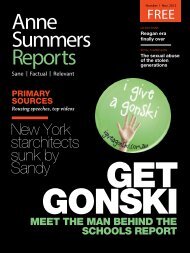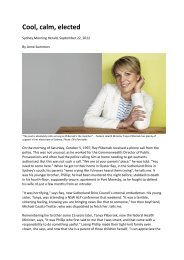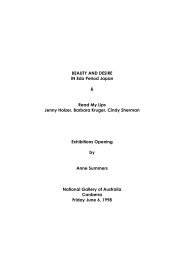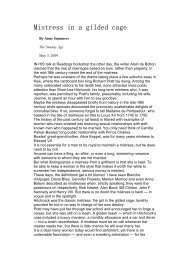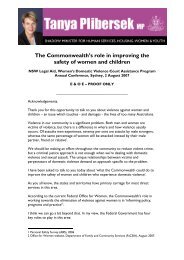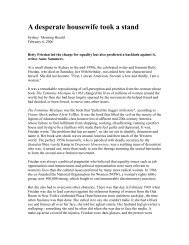Putting Equality Back on the Agenda - The Looking Glass
Putting Equality Back on the Agenda - The Looking Glass
Putting Equality Back on the Agenda - The Looking Glass
Create successful ePaper yourself
Turn your PDF publications into a flip-book with our unique Google optimized e-Paper software.
HREOC itself and <strong>the</strong> individual commissi<strong>on</strong>ers. HREOC was stripped of<br />
<strong>the</strong> power to c<strong>on</strong>duct public hearings, and – worst of all – <strong>the</strong> individual<br />
commissi<strong>on</strong>ers for sex, race and disability lost <strong>the</strong>ir complaint handling<br />
powers. <strong>The</strong>se powers were bestowed <strong>on</strong> <strong>the</strong> President of HREOC with<br />
<strong>the</strong> result that <strong>the</strong> powers of <strong>the</strong> individual commissi<strong>on</strong>ers were weakened:<br />
<strong>the</strong>y not <strong>on</strong>ly lost a major part of <strong>the</strong>ir jobs but also <strong>the</strong> specialised<br />
research and knowledge of trends in discriminati<strong>on</strong> that comes with hands<strong>on</strong><br />
complaint handling.<br />
Within three years of <strong>the</strong> commissi<strong>on</strong>er losing her complaint-handling<br />
powers, <strong>the</strong> number of complaints under <strong>the</strong> Sex Discriminati<strong>on</strong> Act<br />
dropped from more than 2000 a year to just over 300.<br />
Was this <strong>the</strong> result of a dramatic decrease in discriminati<strong>on</strong> against<br />
women in Australia? It would be nice to think so. However, o<strong>the</strong>r figures<br />
suggest that <strong>the</strong> opposite was occurring. In Victoria, in 1996/97 <strong>the</strong>re was<br />
a 40 per cent increase in complaints lodged under <strong>the</strong> Equal Opportunity<br />
Act. ix <strong>The</strong> next year, complaints increased by <strong>on</strong>ly 9 per cent but in<br />
1998/99 <strong>the</strong> Commissi<strong>on</strong> received 3,411 complaints, its highest ever, and<br />
an increase of 27 per cent over <strong>the</strong> previous year. x<br />
In o<strong>the</strong>r words, discriminati<strong>on</strong> against women in Australia was not<br />
declining but <strong>the</strong> Howard government was successfully discouraging<br />
women – and o<strong>the</strong>rs with complaints of discriminati<strong>on</strong> – from seeking<br />
remedies under <strong>the</strong> federal legislati<strong>on</strong>. Did <strong>the</strong> government want to<br />
pretend that discriminati<strong>on</strong> did not exist? It certainly seemed that way.<br />
<strong>The</strong> Sex Discriminati<strong>on</strong> Commissi<strong>on</strong>er, Sue Walpole, resigned her positi<strong>on</strong><br />
in February 1997. She had been virtually forced out of <strong>the</strong> job when <strong>the</strong><br />
Prime Minister himself accused her of being a “Labor stooge”. <strong>The</strong> positi<strong>on</strong><br />
remained vacant for 14 m<strong>on</strong>ths. This was a breach of <strong>the</strong> Sex<br />
Discriminati<strong>on</strong> Act, which requires that <strong>the</strong>re is a Commissi<strong>on</strong>er, and was<br />
also ano<strong>the</strong>r indicati<strong>on</strong> of what <strong>the</strong> government thought of <strong>the</strong> rights of<br />
Australian women. While <strong>the</strong> positi<strong>on</strong> was empty, <strong>the</strong> government sought<br />
to merge <strong>the</strong> Sex Discriminati<strong>on</strong> Commissi<strong>on</strong>er’s functi<strong>on</strong> and <strong>the</strong><br />
Affirmative Acti<strong>on</strong> Agency and <strong>the</strong> Office for <strong>the</strong> Status of Women (OSW),<br />
evidently thinking it could simply lump all <strong>the</strong> “women’s business” in <strong>on</strong>e<br />
place where presumably it could be ei<strong>the</strong>r be c<strong>on</strong>trolled, or ignored – or<br />
both.<br />
<strong>The</strong> plan showed massive ignorance of <strong>the</strong> way in which <strong>the</strong> machinery of<br />
government operated. Both <strong>the</strong> Sex Discriminati<strong>on</strong> Commissi<strong>on</strong>er and <strong>the</strong><br />
head of <strong>the</strong> Affirmative Acti<strong>on</strong> Agency were statutory positi<strong>on</strong>s, created by<br />
acts of parliament that <strong>the</strong> positi<strong>on</strong>s were <strong>the</strong>n required to administer.<br />
OSW was a policy advice office operating within <strong>the</strong> Department of <strong>the</strong><br />
Prime Minister and Cabinet and had no competence to administer<br />
legislati<strong>on</strong>. It was a mad idea and ultimately did not succeed, but it was an<br />
indicati<strong>on</strong> of <strong>the</strong> government’s thinking. And, in <strong>the</strong> end, <strong>the</strong> government<br />
got its way: <strong>the</strong> three offices were all downgraded and disempowered and,<br />
in <strong>the</strong> case of OSW, it disappeared altoge<strong>the</strong>r.<br />
6



